Listening to the Genealogy Gems Premium Podcast in iTunes (PC)
PC: Subscribe in iTunes
1. Copy the following address
itpc://lisalouisecooke.com/Premium_Feed/feed.xml
2. Open iTunes
3. From the menu select FILE and then SUBSCRIBE TO PODCAST
4. Paste the address into the box and click OK
5. You will be prompted to enter your Premium membership username (not your email address) and password
6. The feed will launch in your Podcast Library and the most current episode will download. You may be prompted a second time to enter your username and password in order to download episodes.
7. Click the GET ALL button to download all of the available episodes.
The Royal Irish Constabulary Records in New and Updated Genealogical Collections
New and updated genealogical collections for the Royal Irish Constabulary are just the tip of the iceberg this week. Scroll down for more cool finds for New South Wales, Scotland, U.S. marriages, and an update to the Freedmen’s Bureau collections at FamilySearch.
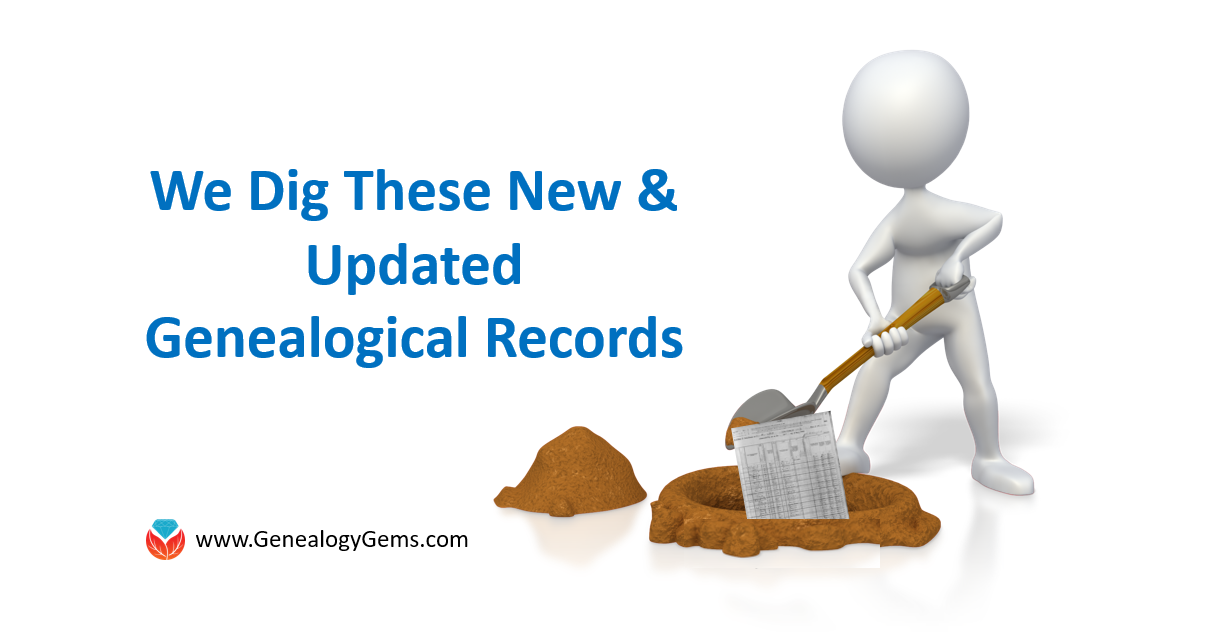
Ireland – Royal Irish Constabulary Records
You can now search the Ireland, Royal Irish Constabulary Service Records 1816-1922 at Findmypast for over 486,000 records that uncover the details of your ancestor’s career with the R.I.C.
Each search result includes an image of the original document and a transcript. The nature of the information recorded will vary significantly depending on the subject and type of the original document. The following is a list of what types of records can be found in this collection:
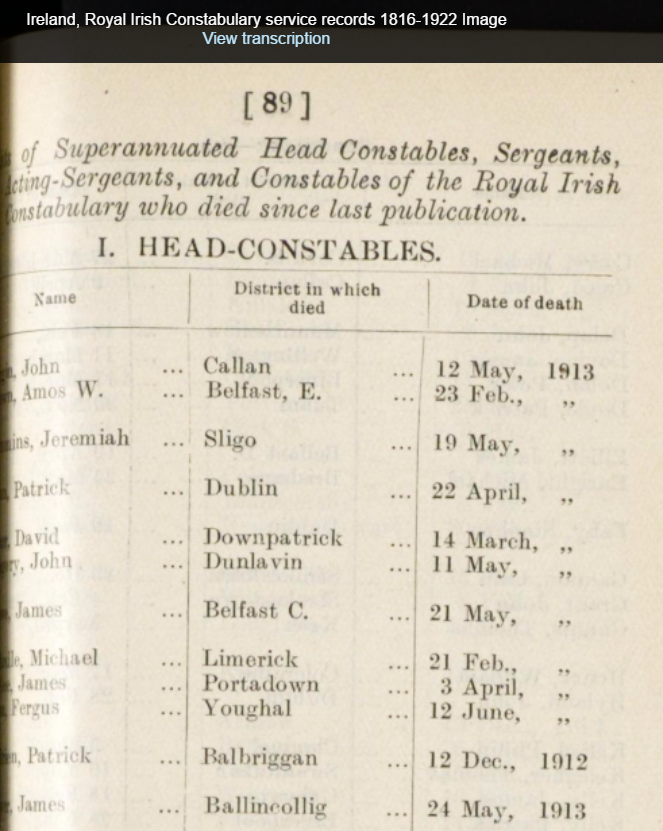
Auxiliary division general registers: These are nominal rolls that recorded member’s service number, rank, dispersed date, and company name. The registers also include division journals that recorded dates of appointment, promotions, and medical details.
Clerical staff: record of service and salaries: These lists of clerical staff include birth date, age at appointment, rank, department and salary.
Constabulary Force Funds: These correspondence registers are of members who paid into the fund with notes on whether they had been pensioned, died or received any rewards from the fund.
Constabulary lists: These are lists of chief constables created during the first year of the Royal Irish Constabulary.
Disbandment registers: These registers are of serving members who were with the force in 1922 when it disbanded after the creation of the Free Irish State. They also noted the number of years the constable served and their recommended pension.
General registers: Records of constables’ service history are contained in these general registers. The entries include the individual’s birth date, native county, religion, previous occupation, date of appointment, and promotions, as well as any rewards or punishments received and the date of pension or discharge.
Nominal returns, arranged by counties: Nominal returns are lists of all serving members of the Royal Irish Constabulary organised by county that recorded the individual’s number, rank, name, religion, date of appointment, marital status, and station location.
Officers’ registers: These registers are lists of Officers that include transfers and dates, favorable and unfavorable records, dates of promotions and details of previous military service.
Pensions and gratuities: Pension records reveal the constable’s rate of pay and the amount of pension calculated.
Recruits index: Lists of new recruits, their dates of appointment and arrival, and their company can be found in the recruits index.
Also at Findmypast, Ireland, Royal Irish Constabulary History & Directories has had a significant addition of over 43,000 records. You will be able to explore a variety of publications between the years of 1840 and 1921. These records will provide insight into the administration and daily operations of the police force.
Each record includes a PDF image of the original publication. The collection includes training manuals, codes of conduct, salary scales, circulars and staff lists that cover promotions, deployments, and rules & regulations.
Ireland – Valuation Books
At FamilySearch, the Ireland, Valuation Office Books, 1831-1856 are now available to search. These records are the original notebooks that were used when the property valuations were conducted between the years of 1831-1856. They are arranged by county, then alphabetically by parish or townland.
Land valuation records may contain the following information:
- Land occupier’s name
- Location, description, and monetary valuation of each land plot surveyed
New South Wales – Passenger Lists
The New South Wales Passenger Lists is a collection at Findmypast that contains over 8.5 million records. The collection includes records of both assisted and unassisted passengers. The assisted passenger lists cover 1828 to 1896 and the unassisted passenger lists span the years 1826 to 1900. Assisted passengers refers to those who received monetary assistance from another party or agency/government for their passage.
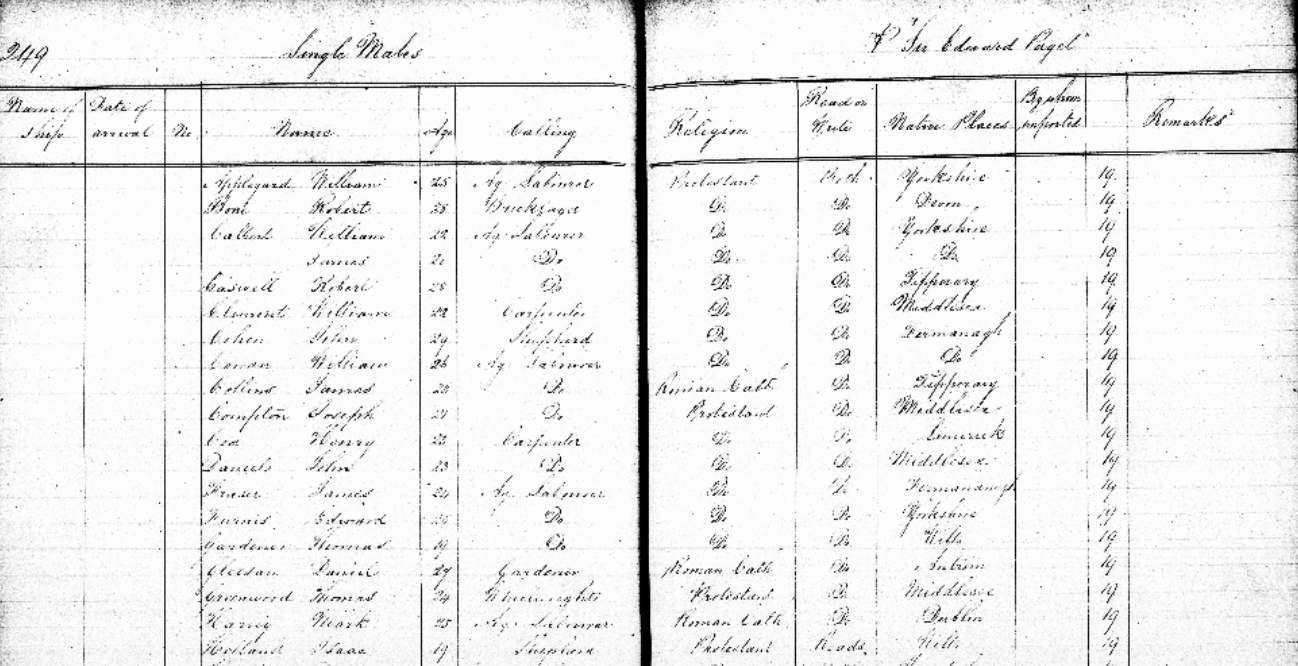
Each result will provide a transcript and image of the original record. The information included on the transcript will vary depending on whether your ancestor was an assisted or unassisted passenger, although most will include your ancestors name, passage type, birth year, nationality, departure port, arrival port and the dates of their travels.
Scotland – Parish Records
The Scotland Non-Old Parish Registers Vital Records 1647-1875 found at Findmypast is a collection of registers created by churches outside of the established church. It contains over 12,000 transcripts of births, marriages, and deaths.
Non-old parish registers are different from the Church of Scotland’s old parish records.
Though these are only transcripts and do not include a digital image of the original, you may find the following information on the records included in this collection:
With each result you will be provided with a transcript of the details found in the original source material. The detail in each transcript can vary depending on the event type and the amount of information that was recorded at the time of the event. Here are some of the facts you may find in the records:
- Name
- Birth year, date, and place
- Event year
- Event type – birth, marriage, or death
- Register name
- Parish and county
United States – Freedmen’s Bureau Records
FamilySearch has updated their magnificent collection of United States Freedmen’s Bureau, Records of Freedmen, 1865-1872. Records found in this collection include census returns, registers, and lists of freedmen. They also include letters and endorsements, account books, applications for rations, and much more. Many of the records will hold valuable genealogical data.
For a complete list and coverage table of the full collection, click here.
United States – Marriages – Oregon and Utah
Ancestry.com has recently updated two marriage collections. The Oregon, County Marriages, 1851-1975 and the Weber and Piute Counties, Utah, County Marriages, 1887-1940 have some new records. Marriage records will often provide many helpful genealogical details. Depending on the year, you may find:
- Name of the groom and bride
- Date and place of the event
- Birth dates and places of bride and groom
- Names of parents of both bride and groom
- How many previous marriages and marital status
- Place of residence of bride and groom
United States – Washington – Newspapers
Washington State historic newspapers added to their digital collection of newspapers this week. With nearly 50,000 digitized pages from historical newspapers based in Centralia, Eatonville, Tacoma, and Spokane newest titles include the Centralia Daily Hub (1914-16), The Eatonville Dispatch (1916-61) and Den Danske Kronike (1916-17), a Danish-English publication based in Spokane.
The Centralia and Eatonville papers were added this month and Den Danske Kronike was added last summer, along with the Tacoma Evening Telegraph (1886-87).
You will be able to search this newspaper collection for free from the Washington State Library website.
Upcoming Events and Lectures for Lisa
We know you want to keep up-to-date with where Lisa will be giving her lectures and presentations. This fall, we have three upcoming events. Here all the details:
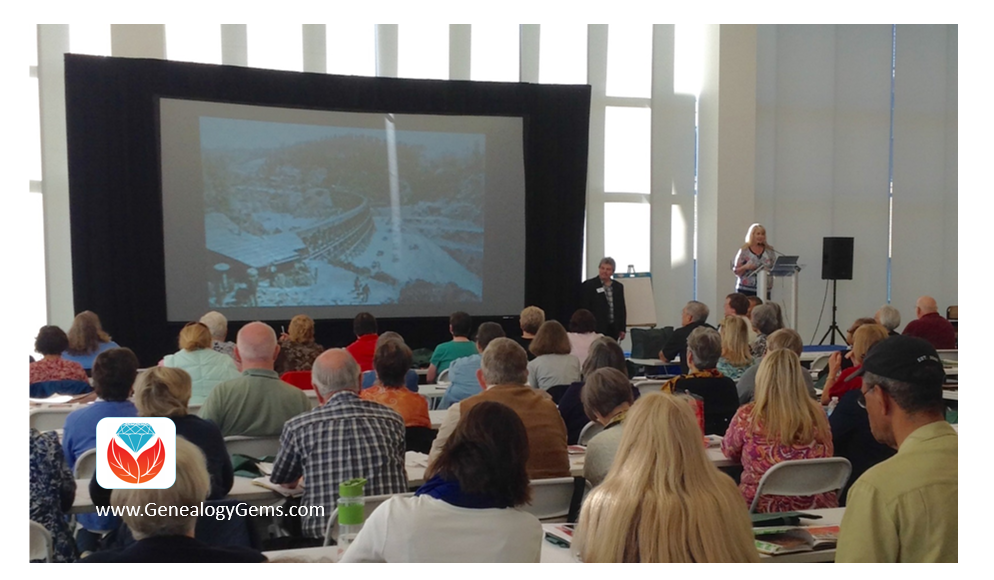
Lisa Louise Cooke speaking at the Columbus Ohio Metropolitan Library
Upcoming Events: Kansas
The Johnson County Genealogical Society will be holding an all day seminar on the 22nd of October. Lisa’s topics include:
- How to Reopen and Work a Genealogical Cold Case
- The Great Google Earth Game Show
- Tap Into Your Inner Private Eye: Nine Strategies for Finding Living Relatives
- Ways to Enhance Your Genealogy Research with Old Maps
What: Johnson County Genealogical Society 2016 Annual Seminar
When: Saturday, Oct. 22, 2016
Where: The Ritz Charles Event Center, 9000 West 137th Street, Overland Park, KS 66221
The event will take place at the Ritz Charles Event Center, 9000 West 137th St., Overland Park, Kansas. Registration is now open. To register online, click here.
Upcoming Event: Texas
Next on the list is the four day conference hosted by the Texas State Genealogical Society. This conference will take place in Dallas on October 27th through the 30th, and includes 35 speakers and an exhibit hall. Lisa will be giving two lectures:
- Beginning Evernote for Genealogists
- Using Google Earth for Genealogy
What: Texas State Genealogical Society Conference
When: Oct. 27 – 30, 2016
Where: Crowne Plaza Dallas Downtown
Online registration and payment is available through October 21st, but after that date you will need to register and pay in-person at the event, if space is still available.
Upcoming Events: Florida
Lisa’s final in-person speaking engagement for 2016 will be presenting as the Keynote Speaker for the 20th Annual Central Florida Family History Conference.
What: 20th Annual Central Florida Family History Conference
When: Saturday, November 12, 2016
Where: Olympia High School at 4301 S. Apopka Vineland Rd., Orlando, Florida.
You can register for the all-day conference online here. If you have a young person who is interested in genealogy, you’ll want to be aware that all students under the age of 18 are admitted free! Learn more details by visiting the Central Florida Family History Conference homepage.
Can’t Make it to an Upcoming Event?
 A Premium Membership to Genealogy Gems will give you access to over 30 of Lisa Louise Cooke’s video classes. From Evernote to DNA, Cloud computing and advanced research techniques, you will find this a great resource for your learning and inspiration. For more information on becoming a Premium Member, click here.
A Premium Membership to Genealogy Gems will give you access to over 30 of Lisa Louise Cooke’s video classes. From Evernote to DNA, Cloud computing and advanced research techniques, you will find this a great resource for your learning and inspiration. For more information on becoming a Premium Member, click here.
New and Updated Genealogical Records for Ireland, Scotland, Korea, and More!
We are digging deep into these new and updated genealogical records this week. We begin with several genealogical records for Ireland and Scotland, then new additions in Argentina. To end our list, a couple of fun finds in Minnesota and the state of Washington!
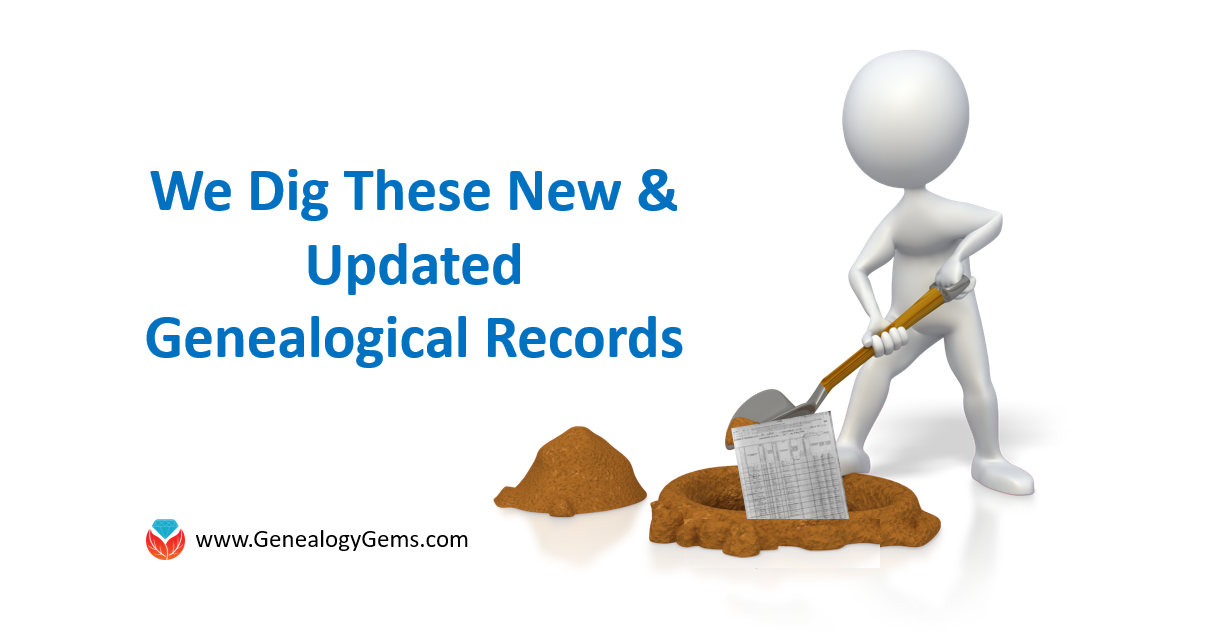
Ireland – Valuation Office Books
New collections have been added to Findmypast and the first is titled Ireland Valuation Office Books. With just under 2 million records, this collection contains several types of manuscript records including field books, house books, quarto books, rent books, survey books, and more.
Each record includes both a transcript and an image of the original document. The amount and type of information will vary depending on the date and nature of the document. Some book types, such as tenure books, include notations about the property as well as notes on the cost of rent and additional observations. House books include descriptions of the property. Quarto books include observations about the tenement.
Ireland – Will Registers
Also new at Findmypast, Ireland, Original Will Registers, 1858-1920 is a collection with over 181,000 records. These records are derived from district courts and held by the National Archives of Ireland. Wills from Northern Ireland are included, up until 1917. Each of the records contain a transcript and an image of the original source document.
Each transcript will provide you with a name, whether the person is heir, executor, or deceased, name of the deceased, and whether the document is a will, grant of probate, or an administration. From the images, you can determine dates, address of the parish, names of other heirs, and other various details.
The images provide much more detail about your ancestor’s will. Most entries have your ancestor’s death date, death place and who inherited the deceased person’s property, and processions. The will can provide the names of many other relations and explain their family connections.
Some wills are more than one page, so you will need to use the arrow on the right side of the image to continue reading the document.
Ireland – Church Records
Lastly, Findmypast has added the new collection titled Ireland, Catholic Qualification and Convert Rolls, 1701-1845. You can search lists of over 50,000 Irish Catholics who swore loyalty to the crown or converted to Protestantism. As a note of interest, Catholics were restricted from owning property or having businesses during the Penal Laws of the 18th century. Because of this, many chose to either convert to the Church of Ireland or swear loyalty to the crown so they qualified for certain rights.
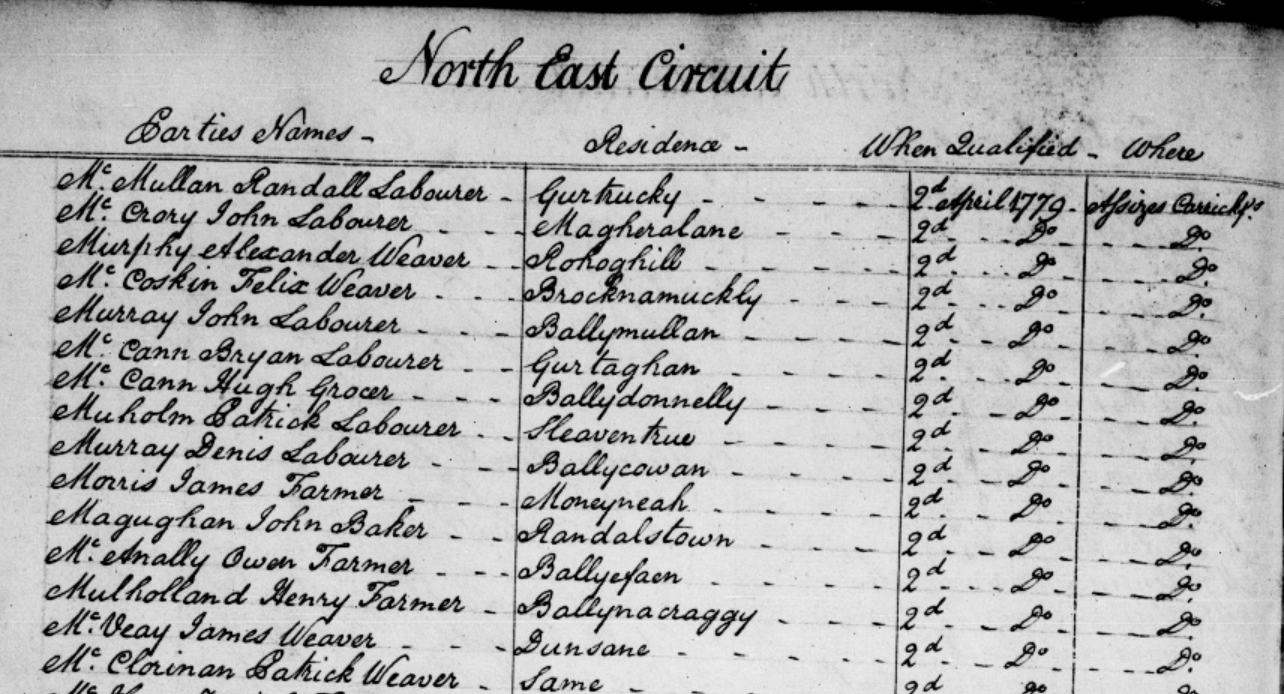
Each record contains a transcript and an image of the original entry. The amount of information varies, but you should be able to find a name, an address, occupation, date of conversion or qualification, date of enrollment or court hearing, and the court.
Glasgow – Electoral Registers
Ancestry has made available over 100 years of electoral registers from the Mithcell Library’s family history collection. These voter rolls have been digitized and can be found in the collection titled Glasgow, Lanarkshire, Scotland, Electoral Registers, 1857-1962.
Electoral registers may provide a name and place of residence, a description of property, and qualifications to vote. Registers were compiled at a local level, with names appearing alphabetically within the wards or districts. Many of the registers in this database have been indexed electronically, which allows you to search them by name, but if you’re searching for a somewhat common name it will be helpful to know the area in which your ancestor lived to narrow your results.
Remember: Parliamentary Division boundaries may have changed over time. If you are looking for a particular parish or place, try searching using the key word field rather than browsing the image sets listed by Division.
Korea – Various Records
Though these two new Korean database collections hold few records in number and they are browse-only at this time at FamilySearch, they are a wonderful step in the right direction. Korean records of genealogical value are not always easily found online. These new Korean collections include:
Korea, Local History, 655-1935 – A small collection of local histories and town records from Korea. The records are written in Korean using Chinese hanja characters. This collection will be published as images become available, so check back from time to time to see what’s new.
Korea, School Records, 1958 – Only 149 images are digitized at this time. We will be watching this closely and update you as new records become available.
In the meantime, see what other collections FamilySearch has for Korea by clicking here.
Argentina – Cordoba – Church Records
FamilySearch has also e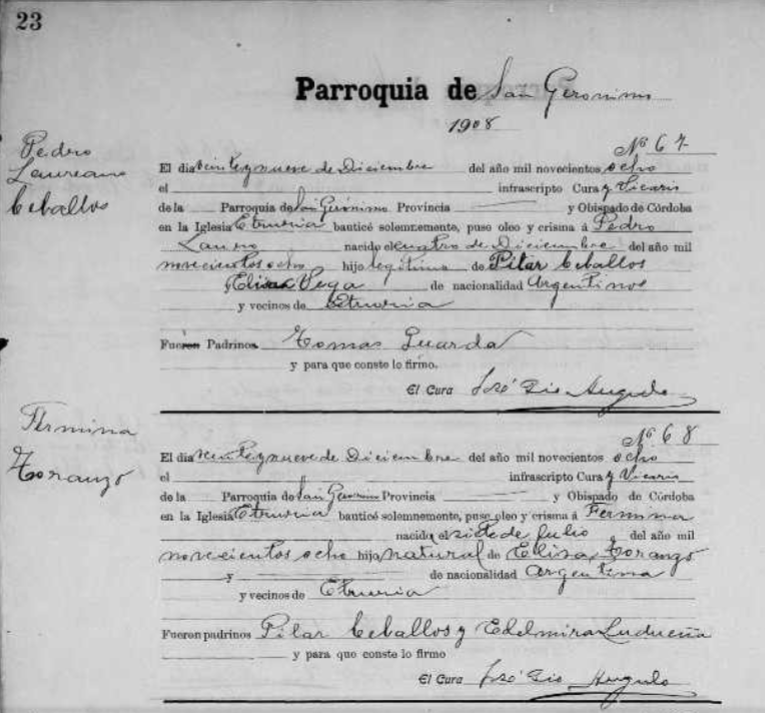 xpanded their Argentina Catholic Church Records in their collection titled Argentina, Cordoba, Catholic Church Records, 1557-1974. This collection nearly doubled with newly digitized and indexed records.
xpanded their Argentina Catholic Church Records in their collection titled Argentina, Cordoba, Catholic Church Records, 1557-1974. This collection nearly doubled with newly digitized and indexed records.
These records are in Spanish. This collection of church records includes baptism, confirmation, marriage, divorce, and death records for parishes in the Córdoba Province.
Catholic Church parish registers are a major record available to identify individuals, parents, and spouses before 1930. After this date, civil authorities began registering vital statistics, which by law included people of all religions.
United States – Washington – Marriage Records
Updated at Ancestry, Washington, Marriage Records, 1854-2013 contains both images and indexes extracted from various records of marriages in Washington.
Marriage records offer the basic facts such as bride, groom, date, and place. These images of marriage certificates may also include additional information such as:
- addresses
- ages
- race
- birthplaces
- occupations
- marital status (single, divorced)
- whether a first marriage
- fathers’ names and birthplaces
- mothers’ names, maiden names, and birthplaces
This database does not contain an image for every document included in the index.
United States – Washington – Naturalizations
Washington, Naturalizations, 1853-1980 database has been updated at Ancestry and contains records created as aliens applied for U.S. citizenship in the state of Washington. It includes both original records and an index extracted from naturalization documents. You will find:
- Certificates of Arrival
- Declarations on Intent
- Petitions for Naturalization
- Oaths of Allegiance
- Certificates of Naturalization
This database does not contain an image for every document included in the index.
Details contained on naturalization records varies based on the year. However, you may be able to find the following valuable information:
- name
- birth date
- country of origin
- arrival date
- place of arrival
- spouse
- children
- document type
- county
United States – Minnesota – Obituaries
FamilySearch expanded two large collections this week and one of those is the Minnesota, Obituaries, 1865-2006. Even though only about 73,000 records have been indexed, there are over 132,000 digital images in the browse-only section.
These obituaries include an index and images of newspaper obituary files filmed by FamilySearch at the historical societies in Minnesota. Indexed records and additional images will be added to this collection as they become available, so be sure to check back frequently.
Many of these digitized records are referred to as obituary cards, which means that the information has been abstracted from the original source. These cards usually contain the following information:
- Name of the deceased
- Age
- Death date
- Names of parents, spouse, children, siblings or other relatives
- Name of newspaper, date and place of publication
- Birth date and place
- Other details such as military service
We hope you enjoy the many new and updated genealogical record collections this week and that you make some new discoveries for your family tree. Don’t forget to share this post with your genealogy friends and help them in their research journey as well!
